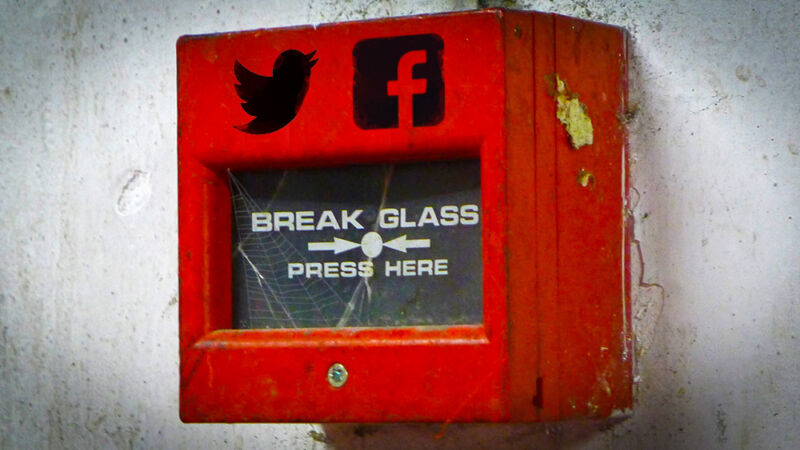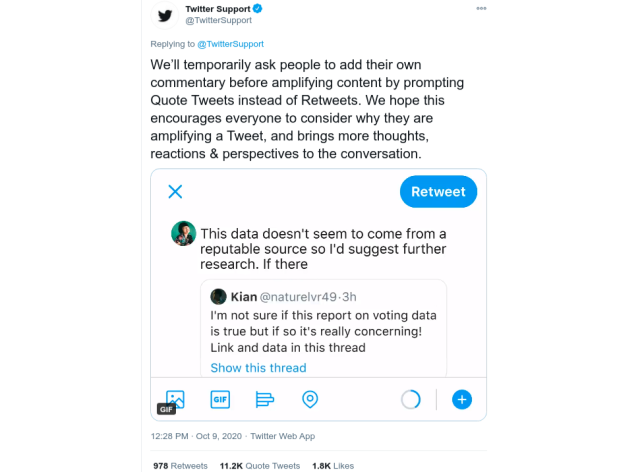

Twitter repeals retweet roadblocks, Facebook follows suit
source link: https://arstechnica.com/tech-policy/2020/12/twitter-and-facebook-roll-back-some-misinformation-prevention-measures/
Go to the source link to view the article. You can view the picture content, updated content and better typesetting reading experience. If the link is broken, please click the button below to view the snapshot at that time.

fake news problem (/s)olved —
Twitter repeals retweet roadblocks, Facebook follows suit
Both Twitter and Facebook are winding down some temporary emergency measures.
Jim Salter - 12/18/2020, 4:45 AM

With the worst of a storm of misinformation—and disinformation—about the 2020 US presidential election behind us, both Facebook and Twitter are relaxing some emergency measures put in place to limit its spread.
Twitter brings back one-click retweets
The most obvious changes taking place are on Twitter, which is getting rid of a measure it put in place in October to encourage quote tweeting (QT) instead of simple retweeting (RT). The intent was to encourage users to add thoughtful commentary and perhaps to actually read original content prior to amplifying it based on a headline alone.
Our goal with prompting QTs (instead of Retweets) was to encourage more thoughtful amplification. We don’t believe that this happened, in practice. The use of Quote Tweets increased, but 45% of them included single-word affirmations and 70% had less than 25 characters. The increase in Quote Tweets was also offset by an overall 20% decrease in sharing through both Retweets and Quote Tweets. Considering this, we'll no longer prompt Quote Tweets from the Retweet icon.
Twitter verification is coming back in 2021
The company is also relaunching its somewhat-controversial verification process—the measure by which one gets a blue checkmark next to one's username on each tweet. The company put the verification process on hold in November 2017, acknowledging issues with perception of verified accounts as endorsed by Twitter. Since then, already-verified accounts have kept the blue check, but few if any new accounts—even those meeting earlier criteria for verification—have been accepted.
AdvertisementThree weeks ago, Twitter asked for public input on a new verification process, and today it has announced plans for the renewed verification program, available in 2021. Not much appears to have truly changed about the program or the process of becoming enrolled—highlights include the "News" category becoming "News and Journalists," and "Sports" becoming "Sports and esports."
There are a few other changes, such as tweaks to the methods in which follower count is measured for accounts which need to meet a certain barrier for verification—but for the most part, the news here seems to be more "verification will be a thing again" rather than any major updates to what verification means or how it works.
Facebook decreases boost for “authoritative” news sources
Facebook's newsfeed algorithm constantly decides what items to prioritize or deprioritize, using a set of metrics designed to increase user engagement. Several days after the November election, it increased the priority of a metric it calls the NEQ score, for News Ecosystem Quality.
Pumping up the NEQ's impact was part of Facebook's "emergency, break glass" plan intended to react to massively increased levels of misinformation as popular votes from the presidential election were still being counted. The increased priority boosted traffic for mainstream news publishers such as CNN, NPR, or The New York Times, while decreasing traffic for partisan sites like Breitbart or Occupy Democrats.
According to The New York Times, some Facebook employees asked if the resulting "nicer newsfeed" could be a permanent fixture. But according to Facebook executive Guy Rosen, the changes were always meant to be temporary. "This was a temporary change we made to help limit the spread of inaccurate claims about the election," continued Facebook spokesperson Joe Osborne. "We're still ensuring that people see authoritative and informative news on Facebook, especially during major news cycles and around important global topics like elections, Covid-19, and climate change."
Recommend
About Joyk
Aggregate valuable and interesting links.
Joyk means Joy of geeK
